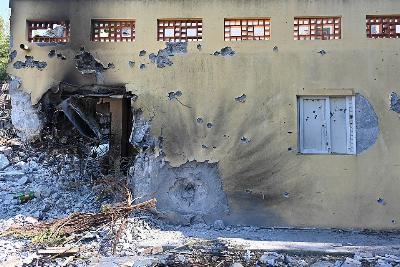Share
Human Rights Voices
While the UN devotes its human rights operations to the demonization of the democratic state of Israel above all others and condemns the United States more often than the vast majority of non-democracies around the world, the voices of real victims around the world must be heard.
Yemen, September 24, 2025
Over 20 wounded, including 2 seriously, in Houthi drone attack on Eilat
Original source
Over 20 people were wounded on Wednesday evening after a drone launched by the Houthis in Yemen exploded in Eilat, days after another smashed into a hotel in the Red Sea resort city.
Medics reported that among the injured were two men, ages 60 and 26, listed in serious condition, along with a 30-year-old who was moderately hurt and 19 others with light wounds.
Most of the wounded were hit by shrapnel, with the Israeli Air Force dispatching two helicopters to evacuate those more severely hurt to Soroka Medical Center in Beersheba. Most of the injured were treated at Eilat’s Yoseftal Medical Center, the country’s smallest general hospital.
Footage from the attack showed the drone impact near a hotel in a shopping area.
The military acknowledged that attempts to intercept the drone had failed, with two Iron Dome interceptor missiles fired at the unmanned aircraft, while noting that sirens had sounded a warning of an attack “according to protocol.”
The Israeli Air Force launched an investigation into the failure.
According to an initial probe by the IAF, the drone was detected late, though sirens were still activated by the Home Front Command to warn civilians. The failure of the Iron Dome to shoot down the drone was possibly because it was flying low, although this was still under investigation. Because of the late detection, the IAF did not have enough time to dispatch helicopters or fighter jets to shoot it down.
IAF chief Maj. Gen. Tomer Bar told Eilat Mayor Eli Lankri that the drone did not represent a new threat and that business in the resort town should continue as usual.
“We will investigate the interception failure, learn and improve,” Bar was cited as saying in a statement issued by the Eilat Municipality.
A military official confirmed the remarks to The Times of Israel.
“There is no new threat here, and there is no reason to stop normal activity in the city,” Bar said.
Bar said that aside from improving air defenses following the second successful attack on the city in a week, the air force would also concentrate on halting the source of the drones: Yemen’s Iran-backed Houthis.
“We will work to remove the threat from the root, while strengthening the defense,” he was quoted as saying.
Prime Minister Benjamin Netanyahu also spoke with Lankri after the attack, saying that “any attack on Israel’s cities will be met with a harsh and painful blow against the Houthi regime, as has already been proven in the past.”
According to the Prime Minister’s Office, Netanyahu told Lankri that he spoke with the senior IDF command about improving Eilat’s air defenses.
Defense Minister Israel Katz, meanwhile, threatened the Houthis following the attack, saying on X: “The Houthi terrorists refuse to learn from Iran, Lebanon, and Gaza, and will learn the hard way. Whoever harms Israel will be harmed sevenfold.”
The Houthis later took responsibility for the attack, claiming to have launched two drones at two separate targets in Eilat, the second of which likely failed to reach Israel.
The Houthis also claimed to have launched several more drones at targets in Eilat and Beersheba a day earlier. There were no reports of drones reaching Israel from Yemen on Tuesday, or any being intercepted, indicating that they all failed to reach the country.
The Houthis have frequently carried out attacks targeting Eilat, including the incident last week in which a drone struck a hotel entrance, causing damage but no injuries. That drone had been identified by the air force, but attempts to intercept it failed, according to the military.
A Houthi attack earlier this month also hit Ramon Airport outside the city, causing damage and lightly wounding one person. That drone was detected, but was not classified as a threat due to a human error, an air force probe found.
Later Wednesday, a ballistic missile launched at Israel by the Houthis fell short outside the country’s borders, according to military officials. The IDF identified the launch, but no sirens sounded in Israel because the missile did not pose a threat.
Since March 18, when the IDF resumed its offensive against Hamas in the Gaza Strip, the Houthis in Yemen have launched nearly 90 ballistic missiles and at least 41 drones at Israel.
The Israeli Air Force carried out strikes, most recently last week, against military infrastructure at the Houthi-controlled port of Hodeida in western Yemen, in response to the Iran-backed group’s repeated attacks on Israel.
Last month, an Israeli strike on Sanaa killed the prime minister of Yemen’s Houthi government and several other ministers, with Israel warning that the attack on the group’s upper echelons was “just the beginning.”

